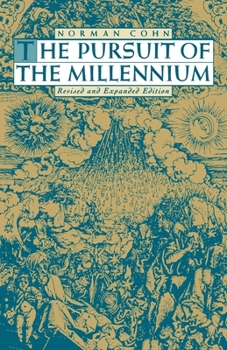The Pursuit of the Millennium: Revolutionary Millenarians and Mystical Anarchists of the Middle Ages
Select Format
Select Condition 
Book Overview
The end of the millennium has always held the world in fear of earthquakes, plague, and the catastrophic destruction of the world. At the dawn of the 21st millennium the world is still experiencing these anxieties, as seen by the onslaught of fantasies of renewal, doomsday predictions, and New Age prophecies. This fascinating book explores the millenarianism that flourished in western Europe between the eleventh and sixteenth centuries. Covering the...
Format:Paperback
Language:English
ISBN:0195004566
ISBN13:9780195004564
Release Date:May 1970
Publisher:Oxford University Press
Length:416 Pages
Weight:0.93 lbs.
Dimensions:1.0" x 5.5" x 8.5"
Customer Reviews
4 ratings
The Revolt of the Masses in the Middle Ages.
Published by Thriftbooks.com User , 23 years ago
The apocalyptic imagination has always exercised great control over the mind of the Western man - from bands of Jewish zealots in the time of Josephus to the masses of poor warriors in the Crusades to take the Holy Land for Christendom to the mutual hurling of the epithet "Antichrist" between Luther and the Pope, and it has been keenly expressed in the Biblical tradition within the Books of Daniel and Revelations. _The Pursuit of the Millennium_ takes a look at the mass movements and delusions that developed out of this tradition in the Middle Ages and the period following the Middle Ages, the Reformation. Norman Cohn shows how prejudices and hatreds among the poor (especially against the Jews, the clergy, and the wealthy) were used by mystical prophetae in conjunction with the apocalyptic tradition to give rise to mass movements which resulted in much mayhem and bloodshed. For example, the People's and Shepherd's Crusades in the Middle Ages were movements of mindless zealotry which ended in mass slaughter. Cohn examines various sects that developed out of these apocalyptic traditions around such figures as the Emperor Frederick, Joachim of Fiore, and various other individuals and imposters who sought to mobilize the masses of poor. In the later Middle Ages, this type of movement was exemplified among the flagellants, the Brethren of the Free Spirit, Taborites and followers of Thomas Muntzer, the militant wing of the Anabaptists, and later the Ranters in England. Often, these movements incorporated Joachimite speculations about a coming Age of the Spirit, mystical doctrines that made one was free to sin as one pleased (Free Spirit), and communistic ideals that involved belief in a Golden Age in which all men had lived as brothers with all things in common. Class struggle between rich and poor, or between poor and clergy (who were often contaminated by the sins of Avaritia and Luxuria) developed into all out wars. The belief that the apostles had lived in poverty and that God had intended all men to live in a communistic setting gave impetus to many individuals to reject church orthodoxy and form their own apocalyptic movements. These movements depended on the poor who held steadfastly to their often megalomanical leaders in their pursuit of messianic ideals and the coming of the millennium. Cohn does an excellent job of describing this process in detail and deals with much of the mysticism and myth surrounding it.In the modern era, it is apparent that millenarian zeal has not died off at all. The communist revolutions in Russia and the rise of the Third Reich in Germany were both movements in the same line as these earlier mass movements in the Middle Ages. While they have shed much of the apocalyptic myth and become atheistic, the same principles were involved in their formation, and in the formation of similar movements that continue in the world today.
Millennium Bugs
Published by Thriftbooks.com User , 24 years ago
A friend recommended this to me as 'a great read' and I also recommend it to you for the same reason. It is rare that a work can be appreciated for its academic value, and for pure fascination. Who could not but be fascinated by the medieval flagellants, the Taborites, Joachim of Fiore, the Tafurs, the Anabaptists and the Ranters. Some groups awaited the returned of the Emperor Constantine, or Frederick Barbarossa, or even the Duke of Flanders, to herald the last days. Other preached, and practised, Free Love, and community of goods. Startingly, the Anabaptists of Munster (Germany) withstood a lengthy siege for their beliefs, while what was happening inside the walls of the city seemed to prefigure the regime of Stalin. Important to recall the limitations of medieval Catholicism, which drove many into fringe sects, and eventually helped spawn the Reformation. Not that the Protestant princes were any more sympathetic to the Prophets of the Poor. For an academic book, this is also fun to read, though its subject in places in quite grisly.
Eeeeexxxxelllent, as Mr. Burns would say.
Published by Thriftbooks.com User , 27 years ago
When I first read the book, I began in the back--it's divided well so that it reads like small hilarious tales or longer, fascinating and riotous history. The tales are Monty Python-esque, especially because the best Monty Python humor is the use of straight-forward history. From the whacked out tales of Protestant reformation, utopian and distopian enclaves of cultish religious fanatics, to riveting tales of 'witchcraft and mysticism,' this isn't comedic fiction, it's unbelievable History! I love to read this book aloud to others, and that's my highest compliment
A great book on a fascinating period of European history
Published by Thriftbooks.com User , 28 years ago
A book for anyone who has read "The name of the rose" and found the strange groups and sects that move in and out of the narrative as interesting as the story itself. The otherworldly inhabitants of this book come alive as you read and the wonderful "logic" and inevitability of the period become almost obvious. This book contains a unique combination of strict scholarly research and stories that would defy all but the most imaginative of fiction writers.





